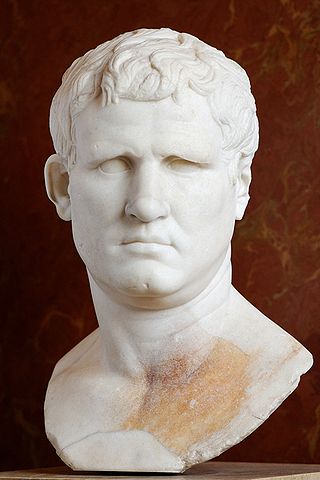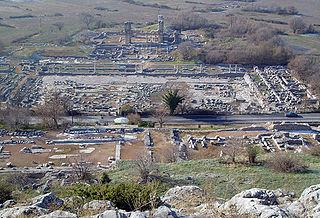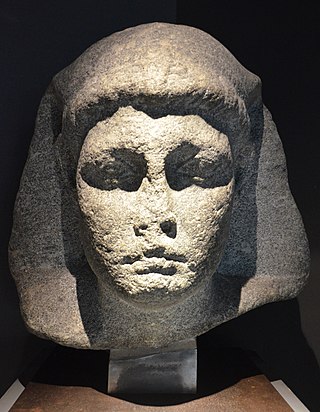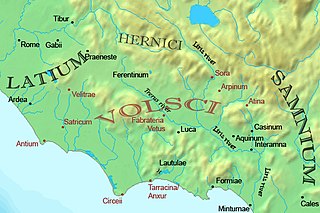Related Research Articles

Aedile was an elected office of the Roman Republic. Based in Rome, the aediles were responsible for maintenance of public buildings and regulation of public festivals. They also had powers to enforce public order and duties to ensure the city of Rome was well supplied and its civil infrastructure well maintained, akin to modern local government.

Marcus Vipsanius Agrippa was a Roman general, statesman and architect who was a close friend, son-in-law and lieutenant to the Roman emperor Augustus. Agrippa is well known for his important military victories, notably the Battle of Actium in 31 BC against the forces of Mark Antony and Cleopatra. He was also responsible for the construction of some of the most notable buildings of his era, including the original Pantheon.

Philippi was a major Greek city northwest of the nearby island, Thasos. Its original name was Crenides after its establishment by Thasian colonists in 360/359 BC. The city was renamed by Philip II of Macedon in 356 BC and abandoned in the 14th century after the Ottoman conquest. The present village of Filippoi is located near the ruins of the ancient city and is part of the region of East Macedonia and Thrace in Kavala, Greece. The archaeological site was classified as a UNESCO World Heritage Site in 2016 because of its exceptional Roman architecture, its urban layout as a smaller reflection of Rome itself, and its importance in early Christianity.

Tiberius Julius Caesar Augustus was Roman emperor from AD 14 until 37. He succeeded his stepfather Augustus, the first Roman emperor. Tiberius was born in Rome in 42 BC to Roman politician Tiberius Claudius Nero and his wife, Livia Drusilla. In 38 BC, Tiberius's mother divorced his father and married Augustus. Following the untimely deaths of Augustus's two grandsons and adopted heirs, Gaius and Lucius Caesar, Tiberius was designated Augustus's successor. Prior to this, Tiberius had proved himself an able diplomat and one of the most successful Roman generals: his conquests of Pannonia, Dalmatia, Raetia, and (temporarily) parts of Germania laid the foundations for the empire's northern frontier.

This article concerns the period 59 BC – 50 BC.
Year 59 BC was a year of the pre-Julian Roman calendar. At the time, it was known as the Year of the Consulship of Caesar and Bibulus. The denomination 59 BC for this year has been used since the early medieval period, when the Anno Domini calendar era became the prevalent method in Europe for naming years.

Ptolemy XV Caesar, nicknamed Caesarion, was the last pharaoh of Ptolemaic Egypt, reigning with his mother Cleopatra VII from 2 September 44 BC until her death by 12 August 30 BC, then as sole ruler until his death was ordered by Octavian.

The pontifex maximus was the chief high priest of the College of Pontiffs in ancient Rome. This was the most important position in the ancient Roman religion, open only to patricians until 254 BC, when a plebeian first held this position. Although in fact the most powerful office in the Roman priesthood, the pontifex maximus was officially ranked fifth in the ranking of the highest Roman priests, behind the Rex Sacrorum and the flamines maiores.

The Senate was the governing and advisory assembly of the aristocracy in the ancient Roman Republic. It was not an elected body, but one whose members were appointed by the consuls, and later by the censors, which were appointed by the aristocratic Centuriate Assembly. After a Roman magistrate served his term in office, it usually was followed with automatic appointment to the Senate. According to the Greek historian Polybius, the principal source on the Constitution of the Roman Republic, the Roman Senate was the predominant branch of government. Polybius noted that it was the consuls who led the armies and the civil government in Rome, and it was the Roman assemblies which had the ultimate authority over elections, legislation, and criminal trials. However, since the Senate controlled money, administration, and the details of foreign policy, it had the most control over day-to-day life. The power and authority of the Senate derived from precedent, the high caliber and prestige of the senators, and the Senate's unbroken lineage, which dated back to the founding of the Republic in 509 BC. It developed from the Senate of the Roman Kingdom, and became the Senate of the Roman Empire.

The Volsci were an Italic tribe, well known in the history of the first century of the Roman Republic. At the time they inhabited the partly hilly, partly marshy district of the south of Latium, bounded by the Aurunci and Samnites on the south, the Hernici on the east, and stretching roughly from Norba and Cora in the north to Antium in the south. Rivals of Rome for several hundred years, their territories were taken over by and assimilated into the growing republic by 304 BC. Rome's first emperor Augustus was of Volscian descent.

In modern historiography, ancient Rome is the Roman civilisation from the founding of the Italian city of Rome in the 8th century BC to the collapse of the Western Roman Empire in the 5th century AD. It encompasses the Roman Kingdom, the Roman Republic, and the Roman Empire until the fall of the western empire.

The Curiate Assembly was the principal assembly that evolved in shape and form over the course of the Roman Kingdom until the Comitia Centuriata organized by Servius Tullius. During these first decades, the people of Rome were organized into thirty units called "Curiae". The Curiae were ethnic in nature, and thus were organized on the basis of the early Roman family, or, more specifically, on the basis of the thirty original patrician (aristocratic) clans. The Curiae formed an assembly for legislative, electoral, and judicial purposes. The Curiate Assembly passed laws, elected Consuls, and tried judicial cases. Consuls always presided over the assembly. While plebeians (commoners) could participate in this assembly, only the patricians could vote.
Acta Senatus, or Commentarii Senatus, were minutes of the discussions and decisions of the Roman Senate. Before the first consulship of Julius Caesar, minutes of the proceedings of the Senate were written and occasionally published, but unofficially; Caesar first ordered them to be recorded and issued authoritatively in the Acta Diurna. The keeping of them was continued by Augustus, but their publication was forbidden. A young senator was chosen to draw up these acta, which were kept in the imperial archives and public libraries. Special permission from the city prefect was necessary in order to examine them.
Commentarii are notes to assist the memory, or memoranda. This original idea of the word gave rise to a variety of meanings: notes and abstracts of speeches for the assistance of orators; family memorials, the origin of many of the legends introduced into early Roman history from a desire to glorify a particular family; and diaries of events occurring in their own circle kept by private individuals. An example of this is the day-book drawn up for Trimalchio in Petronius's Satyricon by his actuarius, a slave to whom the duty was specially assigned. Other commentarii were memoirs of events in which they had taken part drawn up by public men. Examples of these are the Commentaries of Caesar: Commentarii de Bello Gallico on the Gallic Wars and Commentarii de Bello Civili on the civil wars; another example is that of Cicero on his consulship. Different departments of the imperial administration and certain high functionaries kept records, which were under the charge of an official known as a commentariis. Municipal authorities also kept a register of their official acts.
Labici or Labicum or Lavicum was an ancient city of Latium, in what is now central Italy, lying in the territory of the modern Monte Compatri, about 20 km SE from Rome, on the northern slopes of the Alban Hills. Exact location of the original city is however disputed.

Octavia the Younger was the elder sister of the first Roman emperor, Augustus, the half-sister of Octavia the Elder, and the fourth wife of Mark Antony. She was also the great-grandmother of the Emperor Caligula and Empress Agrippina the Younger, maternal grandmother of the Emperor Claudius, and paternal great-grandmother and maternal great-great-grandmother of the Emperor Nero.

The Roman magistrates were elected officials in ancient Rome. During the period of the Roman Kingdom, the King of Rome was the principal executive magistrate. His power, in practice, was absolute. He was the chief priest, lawgiver, judge, and the sole commander of the army. When the king died, his power reverted to the Roman Senate, which then chose an Interrex to facilitate the election of a new king.

The Senate of the Roman Empire was a political institution in the ancient Roman Empire. After the fall of the Roman Republic, the constitutional balance of power shifted from the Roman Senate to the Roman Emperor. Beginning with the first emperor, Augustus, the Emperor and the Senate were technically two co-equal branches of government. In practice, however, the actual authority of the imperial Senate was negligible, as the Emperor held the true power of the state. As such, membership in the senate became sought after by individuals seeking prestige and social standing, rather than actual authority. During the reigns of the first Emperors, legislative, judicial, and electoral powers were all transferred from the "Roman assemblies" to the Senate. However, since the control that the Emperor held over the senate was absolute, the Senate acted as a vehicle through which the Emperor exercised his autocratic powers.

Ludi were public games held for the benefit and entertainment of the Roman people . Ludi were held in conjunction with, or sometimes as the major feature of, Roman religious festivals, and were also presented as part of the cult of state.
An album, in ancient Rome, was a board chalked or painted white, on which decrees, edicts and other public notices were inscribed in black.
References
- ↑ "Acta Diurna". Encyclopedia Britannica.
- ↑ Wright, Brian (2016). "Ancient Rome's Daily News Publication With Some Likely Implications for Early Christian Studies". Tyndale Bulletin. 67. doi: 10.53751/001c.29414 . S2CID 239948306 . Retrieved June 2, 2020.
- 1 2 3 4 One or more of the preceding sentences incorporates text from a publication now in the public domain : Chisholm, Hugh, ed. (1911). "Acta Diurna". Encyclopædia Britannica . Vol. 1 (11th ed.). Cambridge University Press. p. 159.